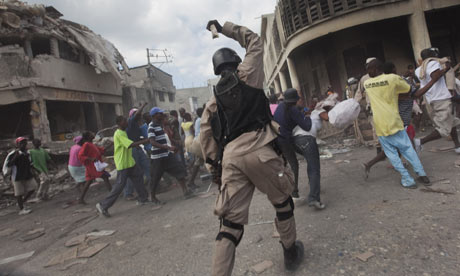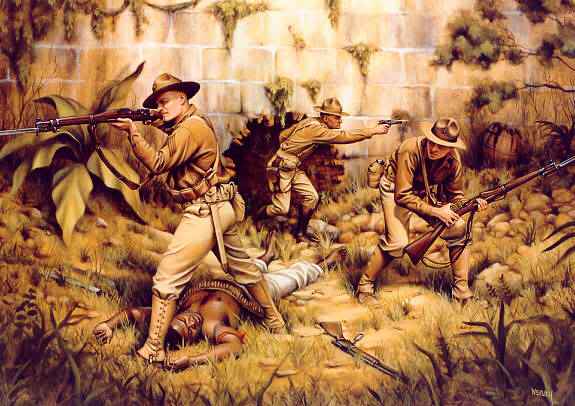 Click for full size image.
Click for full size image.[Originally posted by Stephanie McMillan at Minimum Security]
Watching those who have their eyes on Haiti's future...
 Click for full size image.
Click for full size image.
Brazil and France lodged an official protest with Washington after US military aircraft were given priority at Port-au-Prince's congested airport, forcing many non-US flights to divert to the Dominican Republic.
Brasilia warned it would not relinquish command of UN forces in Haiti, and Paris complained the airport had become a US "annexe", exposing a brewing power struggle amid the global relief effort. The Red Cross and Médecins Sans Frontières also complained about diverted flights.
The row prompted Haiti's president, René Préval, to call for calm. "This is an extremely difficult situation," he told AP. "We must keep our cool to co-ordinate and not throw accusations at each other."
The squabbling came amid signs that aid was reaching some of the hundreds of thousands of people in desperate need of water, food and medicine six days after a magnitude 7 earthquake levelled the capital, killing more than 100,000, according to Haitian authorities.
The UN was feeding 40,000 and hoped to increase that to 1 million within a fortnight, said the secretary general, Ban Ki-moon, as he arrived in Port-au-Prince yesterday. "I am here with a message of hope that help is on the way," he said, speaking outside the severely damaged national palace. He also acknowledged "that many people are frustrated and they are losing their patience."
Ban said he has three priorities in Haiti: saving as many lives as possible, stepping up humanitarian assistance and ensuring the co-ordination of aid coming into the country. "We should not waste even a single item, a dollar," he said.
The plight of 80 elderly people at a partially collapsed municipal hospice just a mile from the airport, now a huge aid hub, showed the desperate need. The body of a dead 70-year-old man rotted on a mattress, nearly indistinguishable from the exhausted, hungry and thirsty people around him. "Others won't live until tonight," an administrator, Jean Emmanuel, told the Associated Press.
The Haitian government has established 14 food distribution points and aid groups have opened five emergency health centres. Water-purification units – a priority to avert disease and dehydration – were arriving.
But with aftershocks jolting the ruins, bloated bodies in the street and severe shortages of water and food many survivors had had enough: an exodus trekked on foot out of the city to rural areas.
The security situation worsened, with some looters fighting with rocks and clubs for rice, clothing and other goods scavenged from debris. In places the embryonic aid machine did not even try to organise distribution. Aid workers tossed out food packets to crowds and US helicopters took off as soon as they offloaded supplies, prompting scrambles in which the fittest and strongest prevailed.
"They are not identifying the people who need the water. The sick and the old have no chance," Estime Pierre Deny, hoping to fill a plastic container with water amid a scrum of people, told Reuters.
Frustration over aid bottlenecks among donors became tinged by national rivalry as it became clear the US was taking ownership of the crisis. A vanguard of more than 1,000 US troops was on the ground and 12,000 were expected in the region by today, including marines aboard the aircraft carrier USS Carl Vinson which anchored offshore as a "floating airport".
The Haitian government, paralysed by the destruction of the presidential palace and ministries, signed a memorandum of understanding formally transferring control of Toussaint L'Ouverture airport to the US. Former president Bill Clinton said he will travel to Haiti today to meet with government officials and deliver much-needed emergency supplies.
The UN mission, which had a 9,000-strong peacekeeping force in Haiti before the quake, seemed too stunned by its own losses to take control. Its dead include its Tunisian head, Hédi Annabi, his Brazilian deputy, Luiz Carlos da Costa, and the acting police commissioner, Doug Coates, a Canadian.
Flights seeking permission to land continuously circle the airport, which is damaged and has only a single runway, rankling several governments and aid agencies. "There are 200 flights going in and out every day, which is an incredible amount for a country like Haiti," Jarry Emmanuel, air logistics officer for the UN's World Food Programme, told the New York Times. "But most flights are for the US military. Their priorities are to secure the country. Ours are to feed. We have got to get those priorities in sync."
France, which as the former colonial power expects a prominent role, protested when an emergency field hospital was turned back. The foreign minister, Bernard Kouchner, said the airport was not for the international community but "an annexe of Washington", according to France's ambassador to Haiti, Didier Le Bret.
Brazil, which saw its leadership of the UN peacekeeping mission as a calling card of its burgeoning influence, was also indignant when three flights were not allowed to land. The foreign ministry reportedly asked Hillary Clinton to grant Brazil priority over chartered flights. Nelson Jobim, the defence minister, said Brazil would not relinquish command duties and suggested it, not Washington, would continue to lead UN forces. Analysts said it was vital command issues be resolved.
The Red Cross and Médecins Sans Frontières complained about flights with medical staff and equipment which were redirected to the Dominican Republic. "We are all going crazy," said Nan Buzard, of the American Red Cross.
The Obama administration has enlisted former presidents George Bush and Bill Clinton to spearhead relief efforts. In a series of interviews both men deflected right-wing accusations that the White House was seeking political advantage from the disaster. "I'd say now is not the time to focus on politics," Bush said, as he sat beside his predecessor. "You've got children who've lost parents. People wondering where they're going to be able to drink water."
[Originally posted by Rory Carroll and Daniel Nasaw at The Guardian]

The U.S. has worked to break Haiti for over 200 years. We owe Haiti. Not charity. We owe Haiti as a matter of justice. Reparations. And not the $100 million promised by President Obama either – that is Powerball money. The U.S. owes Haiti Billions – with a big B.
The U.S. has worked for centuries to break Haiti. The U.S. has used Haiti like a plantation. The U.S. helped bleed the country economically since it freed itself, repeatedly invaded the country militarily, supported dictators who abused the people, used the country as a dumping ground for our own economic advantage, ruined their roads and agriculture and toppled popularly elected officials. The U.S. has even used Haiti like the old plantation owner and slipped over there repeatedly for sexual recreation.
Here is the briefest history of some of the major U.S. efforts to break Haiti.In 1804, when Haiti achieved its freedom from France in the world’s first successful slave revolution, the United States refused to recognize the country. The U.S. continued to refuse recognition to Haiti for 60 more years. Why? Because the U.S. continued to enslave millions of its own citizens and feared recognizing Haiti would encourage slave revolution in the U.S.
After the 1804 revolution, Haiti was the subject of a crippling economic embargo by France and the U.S. U.S. sanctions lasted until 1863. France ultimately used its military power to force Haiti to pay reparations for the slaves who were freed. The reparations were 150 million francs. (France sold the entire Louisiana territory to the U.S. for 80 million francs!)
Haiti was forced to borrow money from banks in France and the U.S. to pay reparations to France. A major loan from the U.S. to pay off the French was finally paid off in 1947. The current value of the money Haiti was forced to pay to French and U.S. banks? Over $20 Billion – with a big B.
The U.S. occupied and ruled Haiti by force from 1915 to 1934. President Woodrow Wilson sent troops to invade in 1915. Revolts by Haitians were put down by U.S. military – killing over 2,000 in one skirmish alone. For the next 19 years, the U.S. controlled customs in Haiti, collected taxes and ran many governmental institutions. How many billions were siphoned off by the U.S. during these 19 years?From 1957 to 1986 Haiti was forced to live under U.S.-backed dictators “Papa Doc” and “Baby Doc” Duvalier. The U.S. supported these dictators economically and militarily because they did what the U.S. wanted and were politically “anti-communist” – now translatable as against human rights for their people. Duvalier stole millions from Haiti and ran up hundreds of millions in debt that Haiti still owes. Ten thousand Haitians lost their lives. Estimates say that Haiti owes $1.3 billion in external debt and that 40 percent of that debt was run up by the U.S.-backed Duvaliers.
Thirty years ago Haiti imported no rice. Today Haiti imports nearly all its rice. Though Haiti was the sugar growing capital of the Caribbean, it now imports sugar as well. Why? The U.S. and the U.S. dominated world financial institutions – the International Monetary Fund and the World Bank – forced Haiti to open its markets to the world. Then the U.S. dumped millions of tons of U.S.-subsidized rice and sugar into Haiti – undercutting their farmers and ruining Haitian agriculture. By ruining Haitian agriculture, the U.S. has forced Haiti into becoming the third largest world market for U.S. rice. Good for U.S. farmers, bad for Haiti.
In 2002, the U.S. stopped hundreds of millions of dollars in loans to Haiti which were to be used for, among other public projects like education, roads. These are the same roads which relief teams are having so much trouble navigating now!In 2004, the U.S. again destroyed democracy in Haiti when they supported the coup against Haiti’s elected President Aristide.
Haiti is even used for sexual recreation just like the old time plantations. Check the news carefully and you will find numerous stories of abuse of minors by missionaries, soldiers and charity workers. Plus there are the frequent sexual vacations taken to Haiti by people from the U.S. and elsewhere. What is owed for that? What value would you put on it if it were your sisters and brothers?
U.S.-based corporations have for years been teaming up with Haitian elite to run sweatshops teeming with tens of thousands of Haitians who earn less than $2 a day.
The Haitian people have resisted the economic and military power of the U.S. and others ever since their independence. Like all of us, Haitians made their own mistakes as well. But U.S. power has forced Haitians to pay great prices – deaths, debt and abuse.
It is time for the people of the U.S. to join with Haitians and reverse the course of U.S.-Haitian relations.
This brief history shows why the U.S. owes Haiti Billions – with a big B. This is not charity. This is justice. This is reparations. The current crisis is an opportunity for people in the U.S. to own up to our country’s history of dominating Haiti and to make a truly just response.
For more on the history of exploitation of Haiti by the U.S., see Paul Farmer, “The Uses of Haiti”; Peter Hallward, “Damming the Flood”; and Randall Robinson, “An Unbroken Agony.”
[Originally posted by Bill Quigley at San Francisco Bay View]